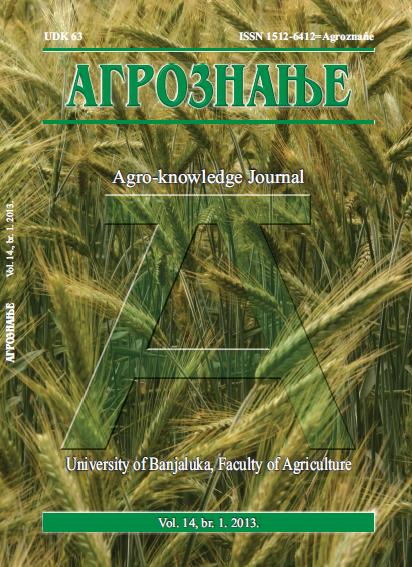Influence of M9 Rootstock on the Reproductive Behaviour of Apple Cultivars under Dry, Semi-arid Growing Conditions
DOI:
https://doi.org/10.7251/AGREN1301005DAbstract
In the last decade, apple has been intensively cultivated in the western coast of Albania. The scope of this research was to study the influence of M9 rootstock on the reproductive behaviour of apple cultivars ‘M. Gala’, ‘Golden Delicious’, ‘Starking’, ‘Fuji’ and ‘Pink Lady’. The trial was conducted from 2010 – 2011 in 5-year old orchards with 2,250 trees/ha grown as French axe and in full production located in Lushnja. The following indicators were measured: diameter of two main branches, number of fruits/branch, fruit growth dynamic and sugar content (%). Global radiation, temperature and humidity were recorded. The reproduction behaviour has also been measured by fruiting spurs in the general structure of the canopy as well as the number of fruits formed for each cultivar. The results have shown that in terms of fruit set, cultivars are ranked as follows: ‘M. Gala’ with the highest number of fruits, then ‘Golden Delicious’, ‘Fuji’, ‘Pink Lady’ and ‘Starking’, respectively. The dynamic of fruit dropping shows that ‘Starking’, having the lowest fruit set, after the June drop is more stable while ‘M. Gala’, with the highest fruit set, besides an abundant June drop, had another drop in July. This is due to higher competition among the fruits and failure of the rootstock to supply the adequate quantities of sap. In terms of fruit growth dynamic, it was observed that intensive growth was measured for all the cultivars during the end of July after which fruit growth slowed down. Changes between cultivars were observed in relation to the maturation period of each cultivar, with ‘M. Gala’ maturing in August, ‘Fuji’ and ‘Pink Lady’ in October and November. ‘Starking and ‘Golden Delicious’ cultivars had a more rapid maturation (20 September), accompanied with a higher sugar content which is far more related to climatic factor rather than M9 rootstock. In conclusion, it was found that the cultivars under study have different reproductive behaviour with M9 rootstock. It can also be stated that ‘Starking’ is not appropriate for this coastal region due to inadequate fruiting behaviour.Downloads
Published
2013-11-15
Issue
Section
Articles

